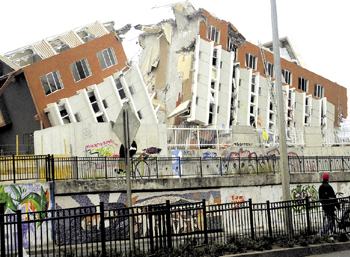
Rebuilding Chile could cost an estimated $30 billion Battles over rebuilding after earthquake in Chile
More Chilean property owners are coming forward to pursue legal action against their buildings’ developers, whom they allege built structures not sturdy enough to withstand the 8.8-point earthquake that ravaged the country in February.
The demand has grown so great that a 300-person pro bono legal group called Legal Help Chile has formed to help property owners whose homes or investments were not properly constructed, according to the Santiago Times. “The program’s goal is to legally position the community, clear their doubts, indicate the paths they can follow or what institutions they can turn to,” Pablo Guerrero, president of Legal Help Chile, said.
This news comes on the heels of Chilean President Sebastián Piñera’s announcement last month that rebuilding his country could cost as much as $30 billion, according to Bloomberg news.
In down market, Mexico poised to draw U.S. retirees
More U.S. retirees may soon be buying property in Mexico, according to the International Community Foundation, thanks in part to the country’s relatively low cost of living and closeness to the U.S. Coastal communities could become especially popular, in part, the organization says, because they tend to meet the needs of retirees on a budget — experts say they offer the same perks as other beachfront communities but at lower prices.
In a study released last month that tracks the habits of U.S. retirees in Mexico, the foundation reported that those retirees were often younger than average — upward of 50 percent were under the age of 65 — and a third of them were single. More intriguing, however, is that around 80 percent of the respondents were also homeowners in Mexico, many of whom bought in all-cash deals.
While around half the respondents in the study said that crime remained a concern for them, many others cited the cheaper home prices as ample motivation to make the move.
UK home prices raise double-dip fears
Residential property prices stayed nearly flat in the United Kingdom in March, according to PropertyWire, climbing just 0.1 percent month-over-month. London, meanwhile, saw a price decrease of around 2.5 percent during the same time period. (The monthly data is through March 15.)
A historically active time of year in the residential market, the March performance came as a surprising development to many market analysts, who now worry that this may precipitate a so-called “double-dip” market slide.
“The small March [performance] shows how much more unpredictable the market has become,” Miles Shipside, the commercial director at real estate tracking company Rightmove, told PropertyWire. “In some areas, more restrained pricing is required as a direct consequence of buyers having more choice.”
The poor pricing performance is being blamed in part on the dramatic uptick in the number of properties placed on the market between February and March. Inventory climbed 17.5 percent month-over-month, and 34 percent year-over-year.
The National Institute for Economic and Social Research told PropertyWire that residential prices in the UK could decline around 1 percent by the end of this year and 3.5 percent next year.
Compiled by Amy Tennery